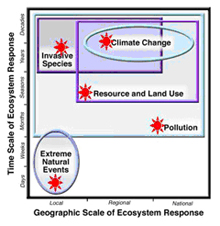What are Ecological Forecasts?

Stresses to coastal ecosystems cover several space and time scales. Ecological forecasts can help to integrate the results over these many different scales.
Ecological forecasts provide predictions of the impacts of chemical, biological, and physical changes on ecosystems, ecosystem components, and people. Ecological forecasts can:
- lead to better decisions in managing ocean and coastal resources;
- improve communication between scientists and resource managers to solve problems; and
- focus future scientific activities to better understand these key environments.
Ecological forecasts bring together wide-ranging scientific research and observations. Scientists integrate various data sets on the present condition of the coastal environment and produce predictions of future conditions using different management scenarios. These forecasts allow managers to decide what actions to take to better manage our nation's coastal resources. Forecasts are a bridge between scientific research and government decision making. Successful forecasts depend on partnerships at multiple levels—with universities, local and state governments, and other federal agencies.
Examples of Ecological Forecasts
There are many types of ecological forecasts. Some are like weather forecasts, with predictions of what is likely to happen at particular locations in the short term (for instance, when and where sea nettles will appear in the Chesapeake Bay). Others, however, focus on longer term or more broad issues (such as year-to-year variations in fish stocks). Ecosystem responses play out on scales ranging from hours to decades and from local to global.
